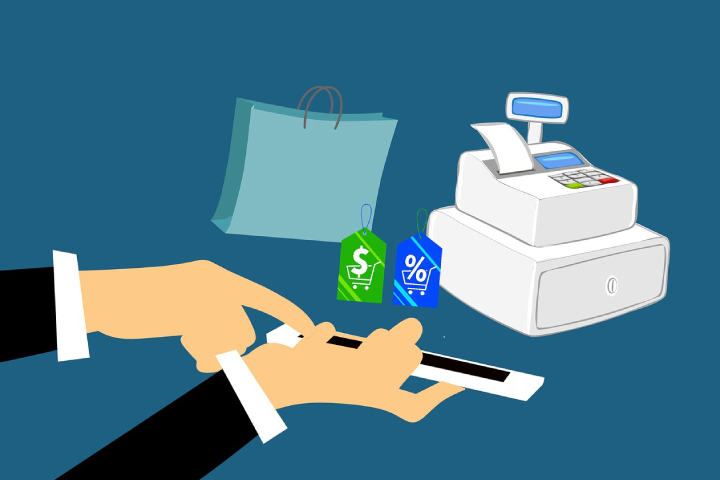Artificial Intelligence (AI)
How Technology Will Reshape Shopping In The Future

Gone are the days you’d spend hours at the mall looking for the perfect wedding gift only to wait in line for ages to check out and pay. More and more consumers are looking at technology to ease their purchasing woes.
The future of shopping is expected to grow in leaps and bounds in the coming years as technology continues to evolve at a fast pace. We see the death of brick-and-mortar stores as e-commerce takes the lead. Customer experience is quick, seamless and convenient.
Nowadays, with a tap on your Smartphone, you can access thousands of items from a wide range of retailers and have it delivered to your doorstep. With some price comparison websites, you can visit multiple stores and pick the ideal item. All while sipping your cup of Joe in your pyjamas.
Disruption in the tech sector will change the way you shop. Most traditional physical stores are barely surviving the digital onslaught. Digitization is blowing like an incessant wind in the shopping sector. For the best products for all your needs check out https://www.bestreviews.guide/

Table of Contents
What the next generation should expect:
Online shopping is the norm nowadays, and very few people are trickling into stores to buy products. Today’s shoppers are savvy and virtual. How technology will influence both online and retail shopping and the potential of blockchain and AI when it comes to shopping, is a must-experience. Let’s peek into the future. Shall we?
Virtual Shopping
Ditch the stores and grab the headsets. Virtual reality is setting sail, and you don’t want to miss out on the fun. Virtual reality technology is taking your shopping experience to another level.
How does taking a 3-D selfie of yourself using your Smartphone sound? Or trying out different outfits in VR? Or maybe visiting a virtual shop with your virtual assistants to help you choose what to buy? Brands like Amazon launched VR kiosks in India’s shopping malls. Swarovski and Mastercard teamed up to open a new home decor items section via a VR app. Tommy Hilfiger enhances its customers experience with VR runway shows while IKEA lets its customers design their ideal kitchen in VR before installing it.
However, VR faces a couple of hurdles. The technology is clunky from a user’s perspective, and the field of view is still not excellent. There is a lot of hardware, but if the headaches are erased, consumers will embrace VR fully.
Enter A-Commerce
Before Pokeman Go, no one could predict the potential of Augmented Reality. But with AR sweeping through the tech world, more and more businesses are embracing this futuristic technology.
One of the sectors where augmented reality is creating a disruptive impact is eCommerce. Online shopping has been on the rise for the last two decades, offering consumers a seamless, quick and convenient shopping experience.
One migraine that consumers face with online shopping is determining if a product is the right fit. Augmented reality is a boon to consumerism as it fills this gap. AR brings realism to your shopping experience and allows you to play around with items that were mere still photos in eCommerce. This transforms eCommerce to a-commerce.
Some brands that have adopted e-commerce to enhance customer shopping experience include; Amazon’s AR view feature. Clients can see how a given item will look in their workspace before ordering it.
Sephora has an app which uses ModiFace Technology. It allows its customers to take a selfie and apply cosmetic products to narrow their shopping choices — having a hard time finding the perfect sunglasses? Try Rayban’s new app “Virtual Try-On” that lets you try different sunglasses before picking the right one — no more wasting hours trying different pairs of sunglasses in front of a mirror.
AI shopping
Running out of home staples such as milk, groceries or breakfast cereals will be a thing of the past. AI (Artificial Intelligence) is about to go to turbo drive and change consumer shopping habits in the coming years.
AI will recognize when your pantry is running low, order and restock your items. The items will ebe delivered to your doorstep, all without having to leave your home. You’ll dedicate your boring shopping needs to intelligent AI bots.
Many eCommerce stores are embracing A.I to understand their customers’ needs, generate leads and provide their customers with a convenient experience. Most stores are embracing “conversational commerce” where AI blends with “chatbots” to drive sales.
Chatbots provide a viable customer support solution. Virtual assistants like Siri, Alexa and Google Now can help you discover a new product launch. Virtual personal shoppers like Amazon’s Mona gives you the most relevant product deals tailored to your needs.
Encounter A.I created Mai in 2018, an advanced retail assistant for restaurants and retailers and to help the blind to simplify ordering. The voice-enabled ordering assistant helps individuals transact in on-premise stores, especially those with visual impairment.
Automated retail- scan-and-go stores
Do you recall picking that can of coke or a pack of biscuits from a vending machine when you were young and even now? Automated retail is not a new technology, but we expect it to change the dynamics of shopping in a few years to come.
Amazon Go has embraced this trend. You can walk into a store, pick the product you want to buy and walk out without any interactions with staff. And on checkout be automatically charged for your purchases.
Automated retail is a vast area and covers unmanned kiosks, vending machines and unattended grocery stores. It provides a broad scope of innovation for the future customer. According to PYMNTS.com, the interactive kiosk in the US is expected to hit more than 1 billion in 2020. And the automated kiosk market will be worth $34 billion in 2023 according to Research and Markets.
We are looking forward to the futuristic shopping experience with no cashiers where consumers experience self-checkout.
Conclusion:
In a highly competitive environment, innovation is king to stay afloat. With changing consumer habits, technologists are finding creative and exciting ways of making your shopping experience fun, exciting and hassle-free. The future of shopping is looking bright, and we are looking forward to the futuristic experiences in our shopping sprees.
Helpful Resources:
1. 16 Best (free) AMP – (Accelerated Mobile Pages) WordPress Plugins in [2019]
2. Do Human Translators Have a Reason to Be Afraid of Advancing Technologies
3. Artificial Intelligence And Its Demands To The Programmers
4. The Future Of Furniture Shopping: Augmented Reality Apps
5. How Augmented Reality Will Change The Future Of Design Industry In [2019]
AI Tools
A Guide To Using AI for Knowledge Management
Using AI for knowledge management and to transform massive data pools into actionable insights is not just beneficial; it’s becoming a necessity to stay competitive.

In the digital era, the fusion of AI technology with knowledge management is revolutionizing the way organizations manage and exploit their informational assets. Using AI for knowledge management and to transform massive data pools into actionable insights is not just beneficial; it’s becoming a necessity to stay competitive. Keep reading to unlock the full potential of AI-driven knowledge management.
1. The Intersection of AI and Knowledge Management: A Synergy Explained
Knowledge management traditionally involves capturing, organizing, and distributing knowledge across an organization. When AI steps into this territory, the potential for enhanced efficiency and decision-making emerges. AI algorithms can sort through and analyze data at a rate no human can match, revealing patterns and insights that can be critical for strategic planning. This melding of AI with knowledge management practices is a modern alchemy, creating an invaluable resource.
One of the most significant benefits of integrating AI into knowledge management is the automation of data processing. AI systems can continuously learn from new data, refining their algorithms and providing even richer insights over time. Moving from static data repositories to dynamic knowledge hubs, businesses are now armed with constantly evolving intelligence. This represents a profound shift from data being a static historical record to a dynamic, predictive tool for decision-making.

Customization is another strong suit of AI in this space. Rather than one-size-fits-all information resources, AI can personalize knowledge dissemination to the needs of each employee. The focus moves beyond mere information access to ensuring the right knowledge reaches the right person at the right time.
2. Implementing AI in Your Knowledge Management Strategy
Transitioning to an AI-driven knowledge management system begins with identifying the scope and objectives of knowledge needed. Organizations must be clear about the kind of knowledge that is most valuable and how AI can aid in its cultivation and dissemination.
Following initial evaluations, the selection of appropriate AI tools and technologies becomes the next crucial step. There are various AI solutions designed for specific knowledge management tasks, from natural language processing for content analysis to machine learning models that predict trends and behaviors.
Integrating AI requires a cultural shift within the organization. Employee buy-in is crucial, and it is important to address any concerns about job displacement head-on. Training and educating the workforce on the benefits and use of AI systems can facilitate smoother adoption, ensuring everyone understands the role of AI as a partner, not a replacement, in the knowledge ecosystem.
3. The Impact of AI on Knowledge Retention and Dissemination

The true value of AI in knowledge management is often most visible when assessing knowledge retention and dissemination within the organization. AI-driven systems can significantly enhance the ability to capture institutional knowledge, store it and make it available in engaging, interactive formats that increase retention.
Analytics are also central to measuring the impact of AI on knowledge management. By evaluating these metrics, businesses can see whether the knowledge is being leveraged effectively, which areas may need more focus, and where improvements can be made.
Furthermore, AI can be a boon for training and development programs. By adapting to the learning pace and style of individual employees, AI can deliver personalized training recommendations and content, leading to more effective learning outcomes.
Altogether, AI is transforming the realm of knowledge management with its capacity to automate, personalize, and revolutionize how information is processed and utilized. Challenges notwithstanding, the rewards of integrating AI into knowledge management strategies are profound, paving the way for smarter.
-

 Instagram4 years ago
Instagram4 years agoBuy IG likes and buy organic Instagram followers: where to buy them and how?
-

 Instagram4 years ago
Instagram4 years ago100% Genuine Instagram Followers & Likes with Guaranteed Tool
-

 Business5 years ago
Business5 years ago7 Must Have Digital Marketing Tools For Your Small Businesses
-

 Instagram4 years ago
Instagram4 years agoInstagram Followers And Likes – Online Social Media Platform
















